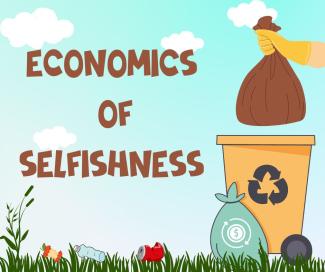
Economics of Selfishness
by Gary Silverman, CFP®
If you were driving by the Texas Travel Information Center, you may have seen a sweaty version of me picking up trash. There’s a wonderful award-winning mountain biking and running trail that’s easily accessed from there (look them up on Facebook under “Wee-Chi-Tah Trail”). After I get done with my trail run, I look for a littered grocery trash bag (never a problem finding one) and pick up a bag or two of trash as I walk back to my car. You’re welcome.
The thing is, I could fill up a lot more trash bags. While some of this stuff gets blown in from surrounding neighborhoods, a good part of what’s laying around is obviously discarded from people who couldn’t bother walking or driving to the many trash cans at the Travel Center.
I can already hear the excuses: It was too far. I didn’t know where the trash cans were. The trash can was full, and I didn’t want to have the stuff leak in or leave an odor in my car. Which brings me to economics. No, really. This is not a rage against litterers. They are doing something we all do, trading one thing for another.
We live in an economic world. There are limited resources that we exchange. Sometimes the resource is time. Other times it is money or minerals. Often it is labor. We freely take part in this exchange. You might convert your time and money for an education. From there you can offer your services (labor) in return for money. You exchange the money for a car or computer, both of which can gain you back some time.
Even the act of giving offers a return, albeit not a monetary one. While it may look one-sided, someone gifting anonymously to a family in need may receive joy, pleasure, or perhaps the release of guilt. And just as we may do things to redeem ourselves, we may choose to take on some guilt—in a sense we pay with it—in order to gain something else. The Styrofoam cup throwers? They may feel a little guilty about their actions, but the price of that guilt is not high enough to pay for the time they would need to spend dumping their residue in a proper receptacle.
That's the economics of it; they pay with guilt, even if it is in the subconscious, and get a clean car in return. Then others pay up to correct problems they didn’t cause, in order to live in a more pleasant environment and not to be bothered by bags and bottles stuck among the weeds.

